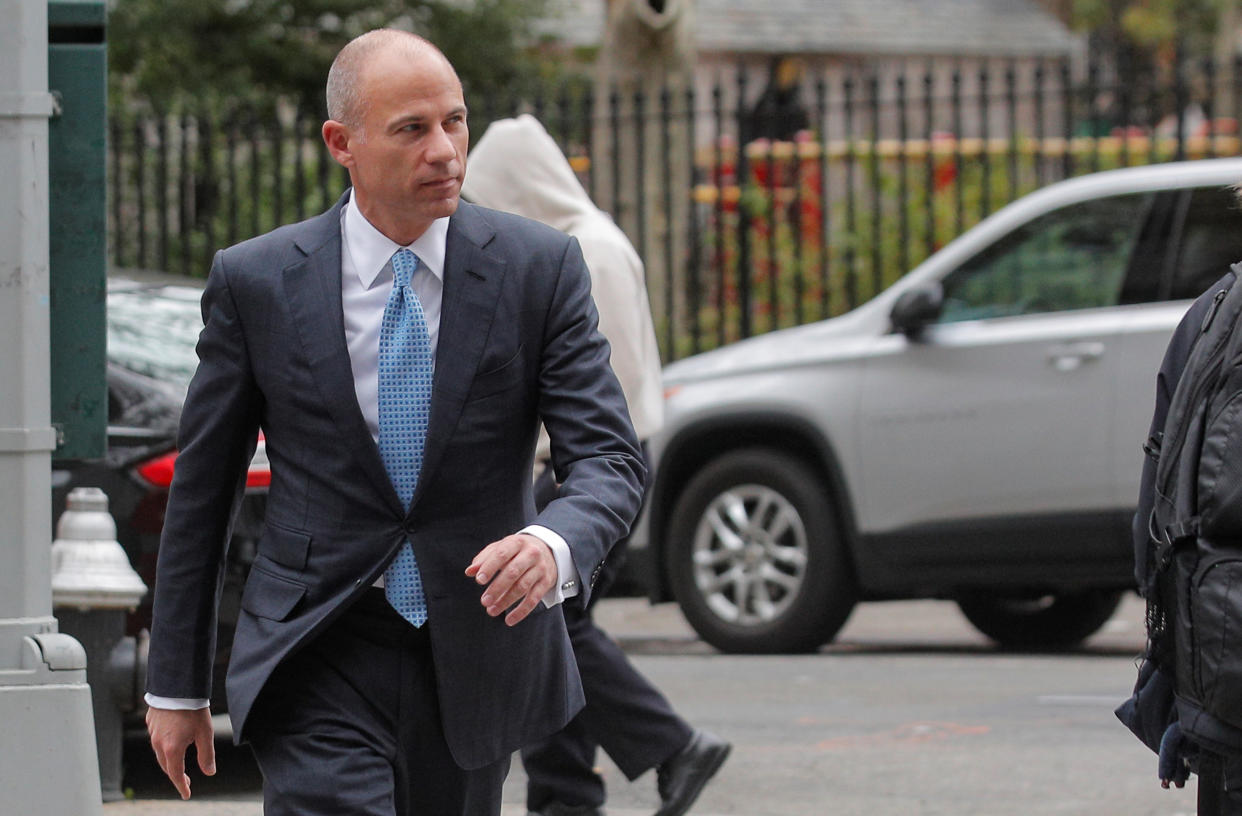Michael Avenatti's trial could expose Nike, college hoops even further — if court grants his subpoenas

- Oops!Something went wrong.Please try again later.
For college basketball, the federal fraud trials involving basketball middleman Christian Dawkins, as well as Adidas executives Jim Gatto and Merl Code, brought plenty of sensational testimony but little else.
The government’s decision to limit both direct evidence and the scope of two trials resulted in convictions for the defendants (still under appeal) and some NCAA infractions cases (and more to come). But there’s been little other tangible impact on the game.
Talk to those involved in the process of recruiting high-end athletes and it’s essentially been business as usual. Except, perhaps, college coaches moving from text message to the more protected Signal app. Whatever the feds were once trying to accomplish fell mostly flat.
Now comes the trial of famed lawyer Michael Avenatti, who has been charged by the Southern District of New York with trying to extort Nike over alleged similar behavior to that which got Adidas in trouble.
Avenatti contends he was just representing a whistleblower, a former Nike Elite Youth Basketball League (EYBL) coach who knew plenty of dirt about Nike’s conduct. Avenatti alleges he was just offering to run an independent investigation for Nike.
Across the basketball world the most commonly asked question since the FBI got involved in busting up the recruiting world is how Adidas, but not industry leader Nike, got in trouble. After all Adidas, everyone says, wasn’t bidding against itself for players. So where’s Nike?
Perhaps now we find out. Or perhaps not.
The trial is set to begin Jan. 21 in Lower Manhattan, and Avenatti, according to court documents, has subpoenaed a number of Nike EYBL executives to testify. Nike has moved to block it. Whoever wins that pretrial argument will determine a great deal about how much the court, the public and the NCAA itself learns about the dealings of the sport.
“Mr. Avenatti would like to elicit the Nike Employees’ testimony to try to establish that Nike engaged in criminal conduct, and that Nike hid this criminal conduct from the Government while claiming to be cooperating,” Nike’s attorneys stated in their Motion to Quash the subpoena, which was filed Thursday. “This narrative — which paints Nike as the villain and Mr. Avenatti as the hero — is false and illogical.”
In addition to two Nike attorneys, Avenatti is seeking at least five Nike employees to take the stand — John Slusher, Lynn Merritt, Nico Harrison, Carlton DeBose and Jamal James. While those names mean little to nothing for fans who fill out a March Madness bracket, they represent the most powerful people at Nike Basketball, all the way down to overseeing travel and high school teams as well as camps and tournaments for top talent.
If Avenatti succeeds and they take the stand, then the testimony and stories that are told could be considerable for the sport. They represent, collectively, a dialed-in group that doesn’t just understand how basketball players are recruited to college, but perhaps even the specifics of individual deals involving individual schools.
While the Adidas trials dragged down a number of high-profile teams (namely Kansas, Louisville and North Carolina State), Nike has a far larger list of sponsored programs, including heavyweights such as Duke, North Carolina and Kentucky.
Nike suggests it has cooperated fully with the government and even investigated itself. The extent of that internal investigation is unknown however and any blanket acquittal of EYBL behavior seems highly questionable to anyone with even cursory knowledge of the sport.
Legally, Nike is arguing that since none of the men subpoenaed had ever spoken to Avenatti, they have no direct knowledge of his crimes and thus shouldn’t have to testify.
They are accusing Avenatti of trying to run a shadow trial concerning Nike’s conduct. Avenatti is countering that proving Nike was engaged in the same nefarious conduct as Adidas assists his defense that he was offering to run a real internal investigation for the company and not trying to shake them down.
“A ‘mini-trial’ is ... what will occur if the Court permits Mr. Avenatti to call the Nike Employees to testify,” Nike argued. “Mr. Avenatti’s defense strategy is to obfuscate: he will do everything he can to argue to the jury that Nike engaged in broad misconduct, that Nike concealed this conduct from the Government, and that Nike ran to the Government only after Mr. Avenatti arrived on the scene.”
Whether that should be permitted is a question for the court.
For everyone else, however, a mini-trial is the most interesting part of the case, likely to produce the kind of dirty laundry that, once upon a time, the SDNY said was the goal of this entire ordeal.
It didn’t happen with the Adidas trials. Will it, now, with Nike?
More from Yahoo Sports:

